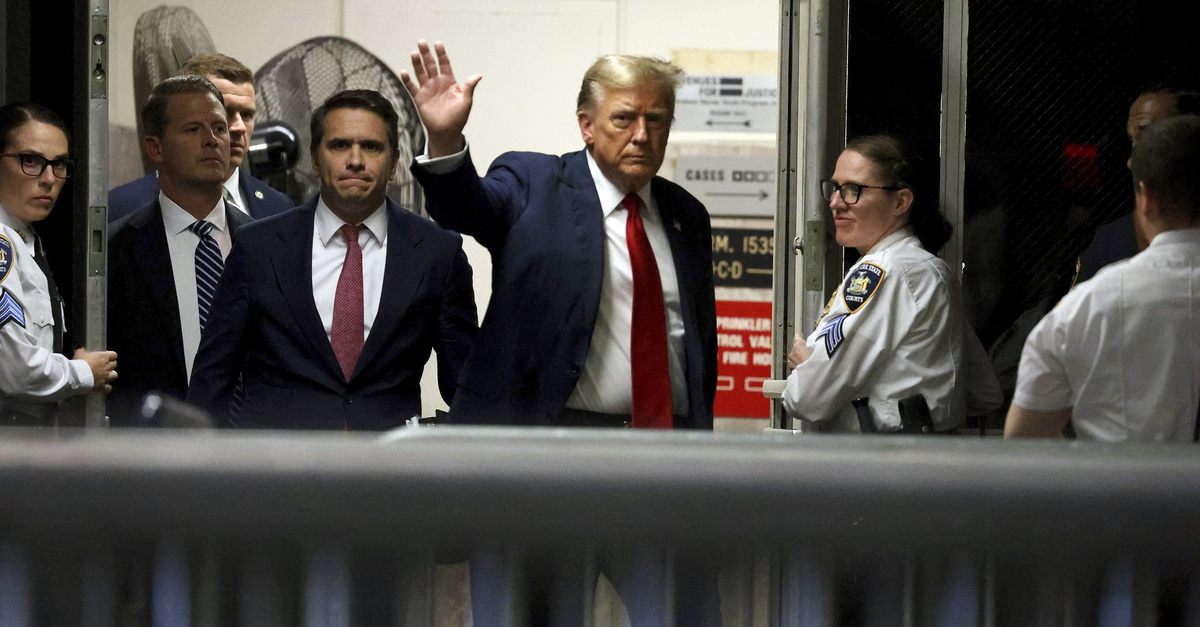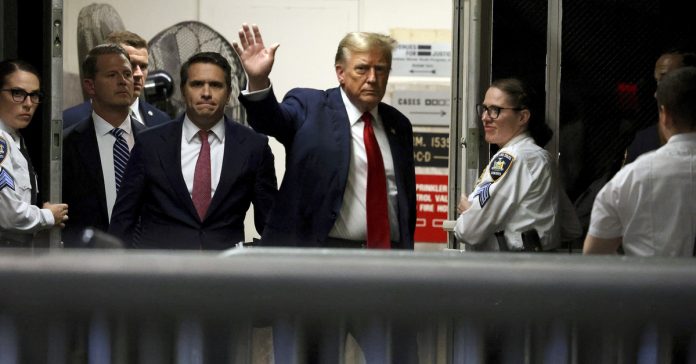
Republican presidential candidate, former President Donald Trump leaves State Supreme Court in Manhattan, on Monday, April 15, 2024, in New York, after the first day of his trial on charges of falsifying business records. (Jefferson Siegel/The New York Times via AP, Pool)
Former President Donald Trump continued to push his case for presidential immunity over his federal criminal charges related to the Jan. 6, 2021, riots at the U.S. Capitol Complex in a Monday reply brief filed with the U.S. Supreme Court.
Attorneys for the 45th president grappled with legal arguments advanced by special counsel Jack Smith in the government’s initial brief filed last week — particularly those arguments concerning similarly-situated former President Richard Nixon.
While the government raised the specter of Nixon and his career-ending Watergate scandal in negative terms, Trump’s attorneys leaned into the example by arguing the legal fallout from that contretemps actually proved points for post-presidency immunity.
To hear the government tell it, Nixon’s resignation and subsequent pardon by Gerald Ford are “implied” proof of their “recognition that a former President was subject to prosecution.”
On the contrary, Trump argues, Ford was simply trying to do at least two things simultaneously with his controversial Nixon pardon.
“President Ford pardoned President Nixon, but President Nixon faced charges for private conduct, not just official acts,” the brief argues.
Trump has long maintained — in both his February petition for a writ of certiorari and his March brief — that his actions on Jan. 6, 2021, despite how they are framed by his political enemies, were “official acts” within the “outer perimeter” of presidential responsibility.
So, in one sense, Ford’s pardon helps Trump’s argument because the pardon encapsulated conduct that was not considered an official presidential responsibility, the brief argues. Trump, on the other hand, is only arguing for immunity over actions that, broadly, concerned “the administration of the federal election.”
At the same time, Ford’s pardon shows he made the independent determination that Nixon could not receive a fair trial in the U.S. court system no matter what, Trump argues in the Monday brief.
“Moreover, President Ford correctly determined that the prosecution of a former President would be incurably divisive and destructive,” the brief goes on. “Citing the ‘years of bitter controversy and divisive national debate,’ President Ford stated that ‘years will have to pass’ before Richard Nixon could hope to obtain a fair trial by jury in any jurisdiction of the United States; that in such a trial, ‘ugly passions would again be aroused, our people would again be polarized in their opinions, and the credibility of our free institutions of government would again be challenged,’ and that prosecuting the former President would ‘prolong the bad dreams that continue to reopen a chapter that is closed.’ Thus, Ford made the same judgment as the Framers — that the prosecution of a former President should not, and could not fairly, proceed in Article III courts.”
The issue of presidential power and how it intersects with the legal system is, necessarily, implicated in Smith’s conspiracy charges against the ex-president for the riots carried out in his name.
Trump, in his Monday filing, harkens back to the institution-defining Supreme Court case of Marbury v. Madison to argue in favor of extensive presidential immunity that survives one’s time in office.
Where the president’s official acts are concerned, the criminal legal system simply has no oversight role — not ever, not even after a president leaves office, Trump argues. The only oversight role is reserved for Congress. And, Trump insists, this is all about the separation of powers that undergird the U.S. system.
“The Framers established impeachment and conviction as a single, carefully circumscribed exception to the general principle of the separation of powers, designed to serve as a structural check against the Presidency,” the brief goes on. “Respondent argues that Marbury applies only to ‘the President’s ongoing administration,’ not to ‘a former President.’ But Marbury held that a President’s official acts ‘can never be examinable by the courts.””
The Monday brief concludes by hashing out potential procedural fallout in the event the court is convinced by the immunity argument.
Smith previously asked the nation’s high court to remand the case down to the district court level for a criminal trial even if the nine justices determined Trump is entitled to some presidential immunity. That’s because, the government says, at least one of the charges — attempting to arrange a slate of fake electors to move Electoral College votes into Trump’s column — does not concern official conduct.
Trump claims this argument misses the mark because the indictment charges the defendant with the improper “use of official power” to obtain a “private end.” The former president says the government cannot look into any president’s motives for his official acts “at all.”
This claim cites Supreme Court precedent that says an executive “should not be under an apprehension that the motives that control his official conduct may, at any time, become the subject of inquiry.”
Have a tip we should know? [email protected]

